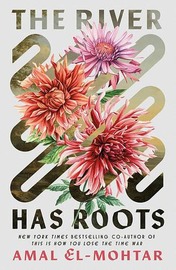The River Has Roots
by Amal El-Mohtas, 2025
A Review
To begin with, I have made a particular study of the lore of the Good Folk, a.k.a. “Cousins.”
So, the use of the pronoun “they” conforms to proper use by some of the Fae tribes, whose gender and shape are variable. Rarely have I seen or heard so striking an interpretation of such a nature.

I might also direct folks to a good etymological dictionary and direct attentions to the words glamour and clamor. These have the Proto-Indo-European prefix “GLA- or KLA-, meaning sound. So a proper glamour should have its root or trigger component in an audible, preferably a vocal utterance. The River Has Roots, strikes me as a glamour in its own right, carrying the reader into an altered state of perception.
The story invokes a family and their relationship with the river Liss, willow tree woodworking, and the Good People. Their genetic heritage conveys a powerful imprint of recognition as potent as individual faces, in many traditions. I also see hints of this in El-Mahtar’s narrative. So, high marks for integrating details into this well-crafted story!
Enough of the details, however, I might suggest readers or audio listeners search for other storytelling devices that convey the nature of the Good Folk of the Otherworld land of Arcadia. What stands out helps the mind to hold to the narrative 😉
The “ceol sidhe” or music of the hills lurks in the language of this outstanding tale. The poetry and music of El-Mohtar’s language casts readers and, even more so, listeners, into the story to amazing affect.
Five Stars ***** to Amal El-Mohtar for The River Has Roots. The craft of the ancient bards live on :),ition.



